A Reverse Osmosis System can do a lot, and soften water is one of the things people ask about often around here.
With so many negative consequences of hard water flowing through your pipes (and into/onto you via consumption or showering), it makes sense that you would want to remedy the issue.
But, if you are looking at a Reverse Osmosis system for your home, you might wonder if this will do the trick.
Here are the short and longer answers.
Does a Reverse Osmosis system soften water? Yes, a Reverse Osmosis (RO) system filter softens the water. Reverse Osmosis systems remove hard water contaminants like calcium and potassium. These systems are not specifically designed for water softening, so the filtration membrane wears out faster than a targeted water softener.

So, while you can use a Reverse Osmosis water filtration system and expect that the resulting filtered water will be much softer than it was pre-filtration, it is important to note that this is not the overall design intention with an RO system.
If you are finding that hard water is the main water problem in your home, you might consider installing a water softener with your whole house (this one I would recommend) water filtration system and then use an RO under sink water filter for consumption-targeted filtration.
Let’s take a closer look.
How Does a Reverse Osmosis System Soften Water (Compared to a Water Softener)?
Since both systems can soften the water that passes through them, it is understandable to still feel a little unassured about which system to install in your home.

Realistically, this will depend on the specific concerns you have with the water in your home and the local area.
But, when looking at the specifics of how each device softens the water that passes through them, you might gain more insight on which system is better for your specific needs.
How Does a Reverse Osmosis System soften water compared to a water softener?
Reverse Osmosis has multiple filtration stages, at least one of which reduces the hard water contaminants in the water as it passes through a semi-permeable membrane. A water softener system uses ion exchange (also found in some RO systems) to specifically reduce hard water minerals.
In this, the key difference is that the Reverse Osmosis water filtration system will inherently soften the water as it removes the contaminants that cause hard water.
However, its main purpose is to filter these contaminants and to replace the “good” minerals in the water through the reverse osmosis process.
On the other hand, a water softener is specifically targeting the minerals that are known to cause hard water (like calcium, potassium, sodium, etc.).
Because of this, the technology used in a water softener (ion exchange) is significantly more efficient at processing the water.
So, while it will not filter it in the same way, it will provide softened water at a greater efficiency resulting in a more economical and environmentally-friendly way to achieve softened water.
Consequently, if you are only aiming to benefit from the reduction of hard water throughout your home, then it is more economically- and environmentally-savvy to simply use a water softener (that can be used with a whole house water filtration system or independently – this one lasts 6 years and you don’t need big bags of salt to replenish it like many others.)

On the other hand, if your issues are more focused on the filtration needs due to higher levels of contaminants (other than or along with those that cause hard water), then you should consider a Reverse Osmosis water filtration system instead.
While it will be less efficient at softening water (requiring more semipermeable membrane filter changes), it can still do this while it also removes other bacteria and contaminants of concern.
Which is Better: A Reverse Osmosis System or a Water Softener?
As you look for your next water filtration device for your home, you might become overwhelmed at the variety of options available.
Fortunately, these options exist to serve your targeted needs.
Not only can you benefit from the high-quality water filtration systems that are available on the market today, but you can find one that is best for the specific issues you are having with water in your home and local area.
Still, this might leave you wondering which system you should get for softening your water.
Which is better, a Reverse Osmosis System or a Water Softener? It depends on the specific concerns you have with your water. If your main issue is hard water and you do not need high-quality filtration, then opt for a water softener. If your main issue is filtration and you would like the benefits of softened water then opt for a RO system.
While one system is not inherently better than the other in simple generalities, it is important to note that these two different types of water filtrations systems do offer various benefits that differ from one another.
So, while a Reverse Osmosis water filtration system might be best for someone’s home, budget, and water filtration needs, someone else might only need a water softener.
Of course, you can install a water softener with your whole house water filtration system since they are typically more efficient at softening the water (as this is their main concern).
On the other hand, Reverse Osmosis water filtration systems work best in systems like under sink water filters (one of my favs) as they can provide higher efficiency for consumption-based water use.

While you might want the benefits of filtered water that a Reverse Osmosis water filtration system can provide, the needs that you have in your shower, clothes washer, and kitchen sink are different.
Targeting the removal of bacteria and toxic contaminants through a Reverse Osmosis system might make sense in one of these areas whereas a water softener might be able to benefit your entire home’s water system (hence the recommendation for using this type of device with a whole home water filtration system).
Do You Need a Reverse Osmosis System with a Water Softener?
So now that you know a little bit about the technology behind a Reverse Osmosis water filtration system (through the use of multiple stages of filtration) and a water softener (through ion exchange), you might be wondering if you should pair the two devices within your home.
Do you need a Reverse Osmosis system with a Water Softener? Since the two systems target different concerns. If your main concern is filtration, then choose an RO system; if your main concern is hard water, then choose a water softener.
Try to remember that a Reverse Osmosis water filtration system can soften water by default, but this is not its intended purpose.
Because of this, you will likely find that the water that passes through your RO filter might be softer, but you will not experience the higher-quality softening of your water as you would through the ion exchange process with a water softener.s.
While this might seem excessive to some, it can sometimes be the best option to provide you with high-quality water filtration to meet your specific needs.
If you find yourself in this boat, where you would like the benefits of water filtration that a Reverse Osmosis water filtration system can provide, as well as the reduction of hard water that a water softener can provide, then you can choose to install both strategically.
So, if this is the case for you, one setup that you can consider is to use a whole house water filtration system with a water softening component.
This would reduce the hard water buildup in your clothes washer, shower, and sinks in general.
Then, you can install a Reverse Osmosis water filtration system under your sink or in another targeted area to provide the benefits of filtered water (removal of bacteria, toxins, and other contaminants) in the water supply locations that you most typically consume water from.
This is on the higher extreme end of the spectrum.
In this setup of two different types of water systems, you gain the benefits of water filtration for the water that you plan to consume, but you can reap the benefits of water softening in the areas that this is most beneficial.
So, while it might take a bit of an up-front investment, you are investing in high-quality water in all aspects of your life.
